Understanding Sikh Funeral Traditions in the UK
May 23, 2025
The air is filled with gentle hymns as people come together. They do this to celebrate a journey back to a divine place, not just to say goodbye. Being at a Sikh funeral in the UK is special because it shows a deep respect for life and death. This respect is very important to the Sikh community.
In the UK, Sikh funerals remind us that life is short but the soul lives forever. These ceremonies are full of old traditions that still mean a lot today. They show the importance of family, community, and faith. Knowing about these traditions helps us see how a community can find comfort and strength in faith when they lose someone.
Key Takeaways
- Sikh funeral traditions in the UK emphasize the celebration of the soul's journey back to Waheguru.
- These ceremonies integrate spiritual beliefs with community support.
- The rituals and prayers are derived from the Guru Granth Sahib.
- Respect and care for the deceased are paramount in Sikh death traditions UK.
- Understanding these practices fosters greater cultural empathy and respect.
Overview of Sikh Funeral Traditions
Sikh rituals in the UK show deep respect for life's brief nature. They see death not as the end. Instead, it's a key step in the soul's path to Waheguru. This belief shapes Sikh cremation customs UK, focusing on the soul's journey, not the loss.
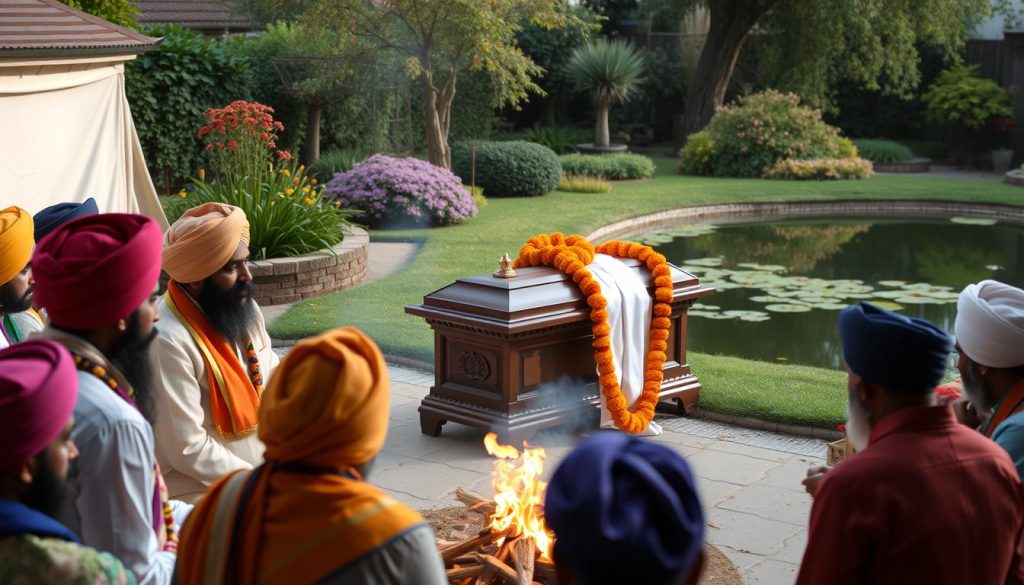
Importance of Death in Sikhism
Death holds great meaning in Sikhism, leading the soul closer to Waheguru. UK Sikh rituals help guide the soul gently. This view changes how death is seen, bringing comfort and reflection at funerals.
Key Beliefs Affecting Funeral Rites
For Sikhs, the body is just the soul's home. This belief makes cremation important in UK practices. At funerals, scriptures and hymns support the soul's passage. These solemn acts show deep respect in Sikh burial rites.
The Role of the Guru Granth Sahib
The Guru Granth Sahib is very important at Sikh funerals. It guides the services with its deep teachings. It helps comfort those who are sad. It also talks about the soul living forever. Let's look closer at how the Guru Granth Sahib is used in Sikh funerals:
Reading of Scripture
During Sikh funerals, reading from the Guru Granth Sahib is key. These readings remind people that the soul lives on forever. It will join with Waheguru. By focusing on these holy texts, those mourning find peace and hope for life after death.
The Significance of Hymns
Sikh hymns are very special at funerals. They are sung to remember the person who has passed away. They also help make the sad feel better. These hymns show the Guru Granth Sahib's important role at funerals. They talk about the spiritual journey and celebrate the life lived. The beautiful verses remind us of our connection to the divine. They stress the importance of keeping faith.
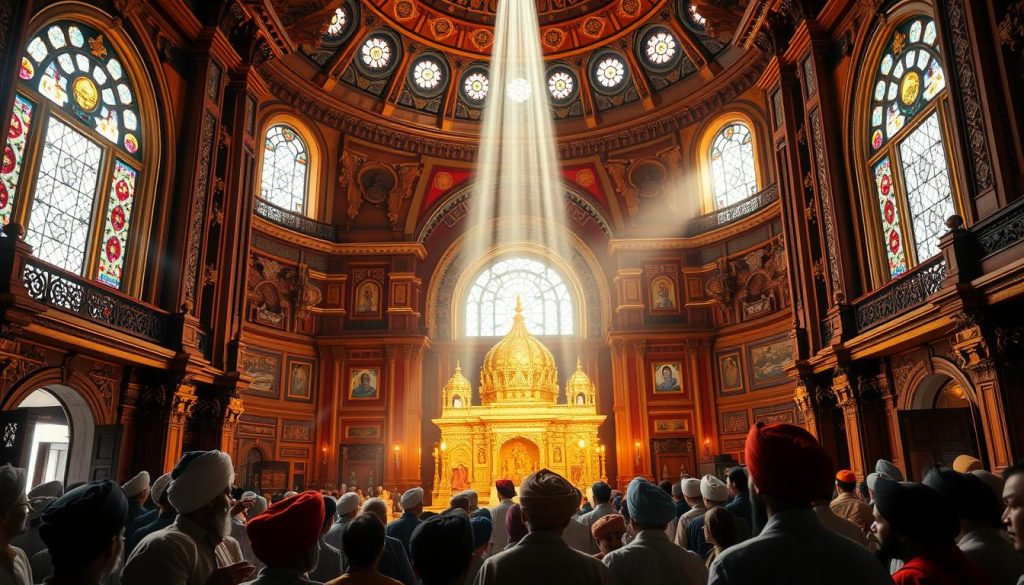
| Element | Description |
|---|---|
| Sikh Funeral Readings | Scripture passages from the Guru Granth Sahib that provide comfort and guidance to mourners. |
| Sikh Hymns | Melodious verses sung during the service to honour the deceased and uplift the grieving. |
| Significance of Guru Granth Sahib in Funerals | The central role of this holy scripture in guiding the ceremonies and reminding of the soul's immortality. |
Preparing the Body for Burial
In Sikhism, preparing the body for burial is full of tradition and respect. These funeral rituals show how to honour the person who has passed away. They also show deep respect for the body as the soul's vessel. Family members lead this process with love and care.
Rituals Involved
Preparing the Sikh body for a funeral includes special washing. The body is cleansed with yogurt and water. This act symbolises cleaning away any earthy impurities. After washing, the body is dressed in traditional clothes.
For those who were committed to their faith, five special items are included. These items are uncut hair, a ceremonial sword, a steel bracelet, a wooden comb, and cotton undergarments. They show the person's faith even after they have passed away.
Importance of Respect and Care
Respect and care are key in Sikh burial rites. Every step is done with great dignity. This shows the belief that we must honour the body as a divine creation. Washing and dressing the body is done carefully. It reflects the family's love and the community's values.
This careful attention helps blend traditional and religious feelings. It offers comfort to those who are grieving.
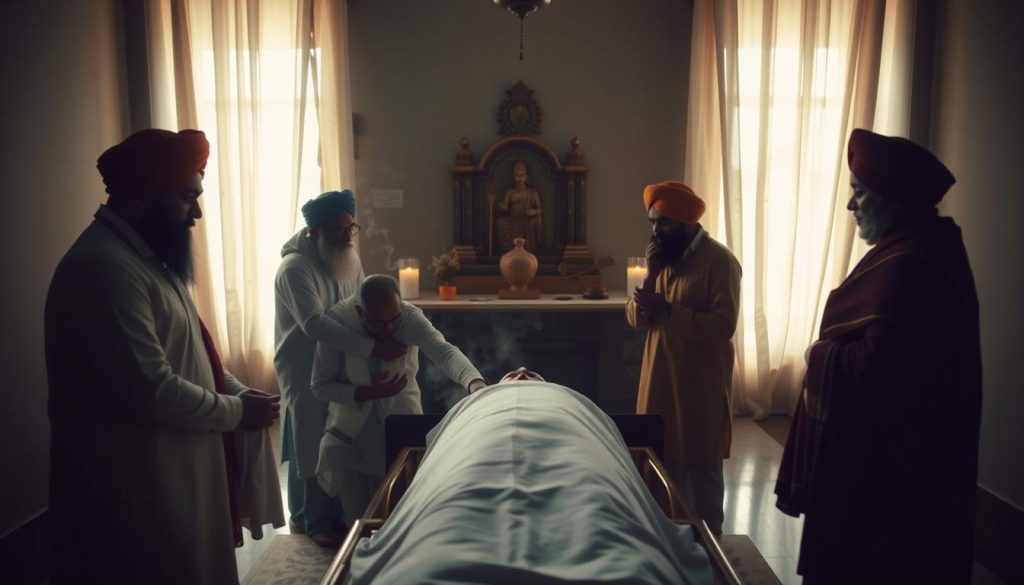
The Role of Family and Community
The importance of family roles in Sikh funerals is big. Families come together during hard times. They do many rites to honor the one who has passed away properly.
Family Responsibilities
Family members have different tasks for preparing the body. They handle the body with care and dignity. They manage prayer services, called "Antam Ardaas," and look after food distribution. These actions show their dedication to culture and paying tribute to those they love.
Community Involvement
The community's role in Sikh funerals is very important too. Community folks join the family to pray and chant hymns. They offer help in many ways. This help lessens the family’s sadness and builds stronger community bonds. It shows the Sikh spirit of togetherness and shared responsibility.
"During dark times, the light of our community guides us, exemplifying the essence of unity and compassion." - Guru Nanak
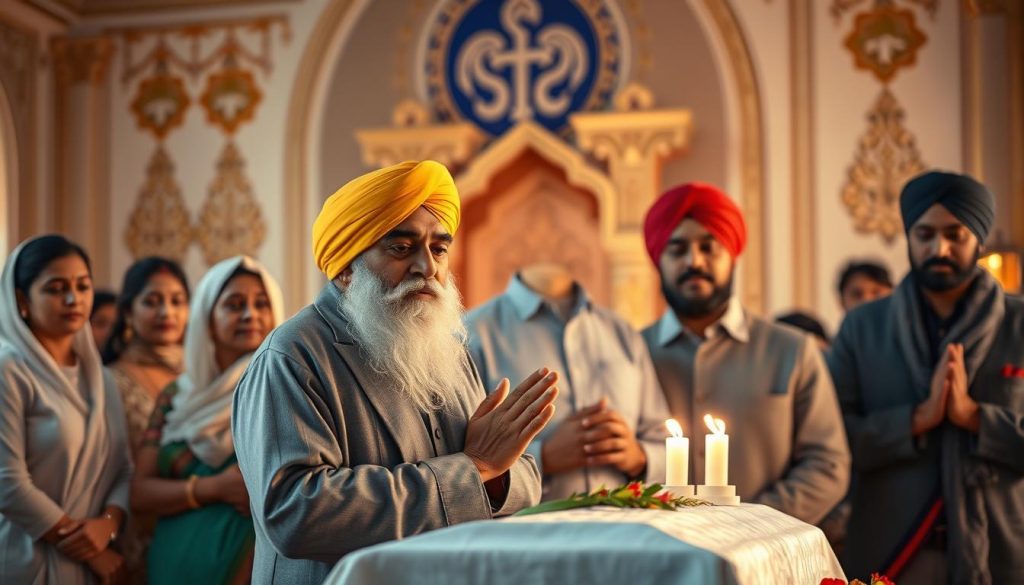
In doing these duties, both family and community keep traditions alive. They weave a strong sense of support and togetherness through this joint effort.
The Place of the Funeral Service
Sikh funeral spots are very important. They honour the person who has died. They also give a place for family and friends to gather. The service can happen at home or in a Gurdwara. Both places are special in their own way.
Options for Service Locations
Finding the right spot for a funeral needs some thought. It should reflect what the family wants and what is best for everyone. Funerals in Sikhism often take place at home or in a Gurdwara. Both spots have their own way of showing respect and following traditions.
Home vs. Gurdwara
Funerals at home are very personal. It lets families feel close and private during rituals. But, having a funeral at home needs more work and planning.
On the other hand, services at Gurdwara bring people together. It is easier for the family too. Gurdwaras have the space and help needed to do funeral rites. They also have religious leaders to help.
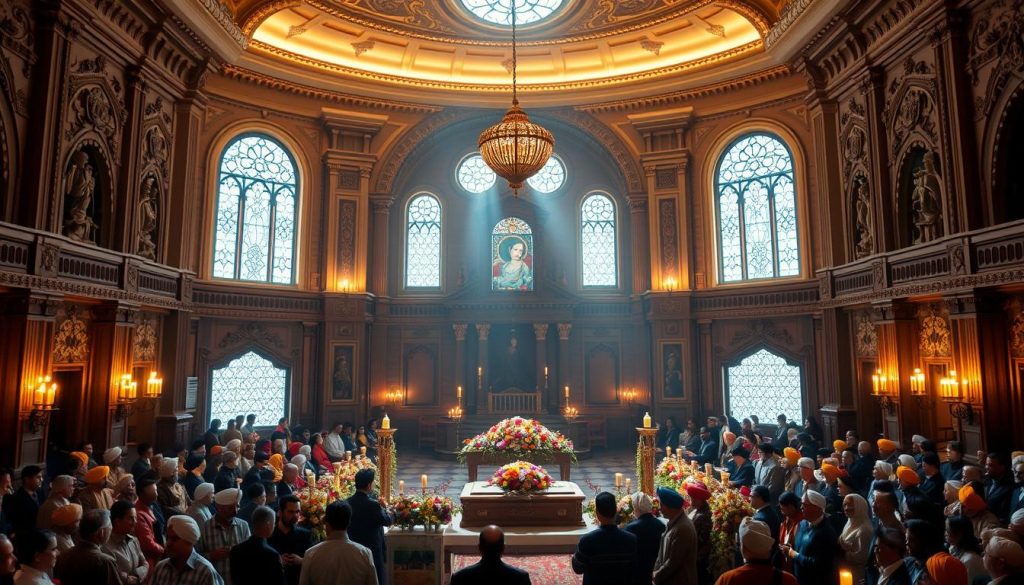
Choosing between a home and Gurdwara takes careful thought. Think about what feels right, what means more, and what is practical. Both places offer support. They help in sending prayers and doing rituals for the soul's journey back to Waheguru.
| Home Funeral Services | Funeral Services at Gurdwara |
|---|---|
| Personal and intimate setting | Communal and supportive space |
| Requires more family effort | Less logistical burden on family |
| Customisable environment | Access to religious leaders |
The Procession: A Cultural Highlight
The Sikh funeral procession is very important in their culture. It's a time when people come together to mourn. The walk goes from the deceased's place to where they are cremated. Everyone sings hymns and prayers, showing grief and supporting each other.
The Funeral Procession Explained
This procession has deep spiritual meaning. It symbolises the end of someone's life here on earth. People chant sacred hymns together. This brings comfort and reminds them about life and eternity in Sikh beliefs. It shows how important it is to help and be united during sad times.
What to Expect During the Procession
In a Sikh funeral, there's a lot of respect and coming together. The body is carried openly, in white, showing purity and calm. Everyone wears simple clothes, follows, sings, and prays. This journey bonds the community, showing how they support each other through mourning.
| Aspect | Explanation |
|---|---|
| Hymns and Prayers | Recited to provide comfort and reflect on spiritual teachings |
| Open Carrier | Symbolises purity and peace, draped in white cloth |
| Community Involvement | Participants dress modestly and follow the hearse, showing unity and support |
Conducting the Funeral Service
The Sikh funeral service is very moving and spiritual. It includes special prayers and readings. These help the soul move on from this world. The Akhand Path involves reading from the Sikh holy book, the Guru Granth Sahib, non-stop.
Traditional Prayers and Recitations
During the service, certain prayers are very important. People come together to read the Guru Granth Sahib. It teaches them about life and how it doesn't last forever. The Kirtan, or hymns, are sung to make the mood peaceful. They help people feel less sad.
Personal Tributes and Eulogies
In Sikh funerals, there is also time for personal messages and eulogies. But these are done gently. Eulogies celebrate the life of the one who has passed. They share stories about what the person did and achieved. This way, the service honors the person while still following Sikh beliefs.
| Aspect | Description |
|---|---|
| Prayers | Continuous reading of Guru Granth Sahib |
| Hymns | Kirtan performed for solace |
| Eulogies | Personal tributes to the deceased |
The Concept of Afterlife in Sikhism
In Sikhism, afterlife ideas mix with reincarnation and the soul's journey to Waheguru, the Supreme Being. This view shapes how Sikhs see death and afterlife. They see it as the soul’s next step, not the end.
Understanding Reincarnation
Reincarnation is key in Sikh afterlife beliefs. Sikh teachings say our soul lives on. It moves through cycles of life, death, and rebirth. Our deeds affect our next life. The big aim is breaking free from this cycle to unite with Waheguru.
The Soul's Journey After Death
When we die, Sikhs believe our soul starts a new journey. Prayers, like reading the Guru Granth Sahib, help guide the soul. Sikh funerals focus on supporting the deceased's soul towards peace and unity with the Creator. This shows the depth of reincarnation in Sikhism.
Post-Funeral Rituals
Sikh post-funeral rituals help us understand the soul's journey and the community's supporting role. They show deep beliefs about life, death, and what comes after.
Antim Ardas: The Final Prayer
The Antim Ardas is a key Sikh post-funeral ritual. It's the last group prayer. The Antim Ardas prays for the departed soul's peace and comforts the family. It shows Sikhism's views on life's shortness and the soul's everlasting journey.
Practices Following the Service
After the Antim Ardas, more rituals happen. There are scriptural readings and shared meals. These acts create a place for thinking about life and death. They make everyone feel together.
Sharing meals is very important after the funeral. It shows support and comfort when people are sad.
The Significance of Mourning Period
In Sikhism, the mourning time is very special. It's when families gather, remember the person who died, and support each other.
Duration of Mourning
Mourning in Sikhism lasts from two to five weeks. Families can adjust this time to fit their needs. It helps them remember their loved ones in a meaningful way.
Cultural Practices During Mourning
During this time, Sikh families do special things to remember the deceased. They pray together, meet up, and read from the Guru Granth Sahib. These activities help them find comfort in their faith and each other.
| Duration of Mourning | Cultural Practices |
|---|---|
| 2-5 weeks | Daily prayers, Guru Granth Sahib readings, communal gatherings |
Sikh Funeral Etiquette
Going to a Sikh funeral in the UK means knowing special customs. We help you show respect properly.
Understanding the etiquette at Sikh funerals is key. It helps you show respect to the family and their community. We'll explain the main rules for Sikh funerals.
Do's and Don'ts for Attendees
It’s important to know how to behave at a Sikh funeral:
- Wear simple, dark clothes. Cover your head with a scarf or one provided there.
- Don't bring flowers or gifts. They are not usual in Sikh traditions.
- Join in the prayers quietly or just watch if you're not Sikh.
- Keep your phone off. Don't do things that could distract others.
- Follow what the family does. They will guide you.
- If unsure about anything, ask a family member or a leader in their community.
Your being there and kind words can greatly help supporting bereaved families.
How to Support the Bereaved
Sikhism believes a lot in being together and kind. Here's how to help those grieving:
- Just being there is a big help to the family.
- Say sorry for their loss in a simple, sincere way. Kindness matters.
- Help out with small things. Maybe cook, help set things up, or just listen.
By respecting etiquette at Sikh funerals, you show care. This helps a lot during sad times.
Conclusion: Embracing Cultural Diversity in Funerals
Looking into Sikh funeral traditions in the UK shows why cultural diversity matters at funerals. By understanding Sikh funerals, we learn how different groups say goodbye to loved ones. This helps us see the world in new ways and connect better with others.
The Importance of Understanding Different Traditions
Learning about various funeral traditions helps us come together. For instance, knowing about Sikh funerals teaches us about their beliefs and mourning rituals. It's key to offering the right support and respect to families from different cultures.
Fostering Respect through Knowledge
Knowing more can help us respect our neighbours. Valuing different funeral practices brings us closer and shows we care about each other’s culture. Being informed and sympathetic helps make a supportive and united community, making everyone feel respected and part of it.
FAQ
What is the significance of death in Sikhism?
How do key beliefs affect Sikh funeral rites in the UK?
What role does the Guru Granth Sahib play in Sikh funerals?
What rituals are involved in preparing the body for burial?
What are the family's responsibilities during a Sikh funeral?
How does the community participate in Sikh funerals?
Where can Sikh funeral services take place?
What does the funeral procession involve?
What happens during the Sikh funeral service?
How does Sikhism view the afterlife?
What are the post-funeral rituals in Sikhism?
How long is the mourning period in Sikhism?
What is the etiquette for attending a Sikh funeral?
How can understanding Sikh funeral traditions foster cultural diversity?
Providing generations of care, with tradition trust and guidance
Locations We Cover
Aldridge | Bilston |Birmingham | Blackheath | Bloxwich | Brierley Hill | Brownhills | Coseley | Coventry | Darlaston | Dudley | Halesowen | Kingswinford | Oldbury | Rowley Regis | Royal Sutton Coldfield | Sedgley | Smethwick | Solihull | Stourbridge | Sutton Coldfield | Tipton | Walsall | Wednesbury | West Bromwich | Willenhall | Wolverhampton
17 Liskeard Road
Park hall
West Midlands
WS5 3EY
01922 438503

